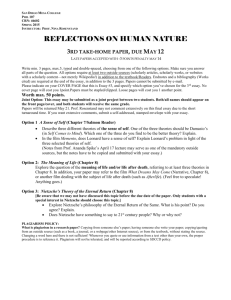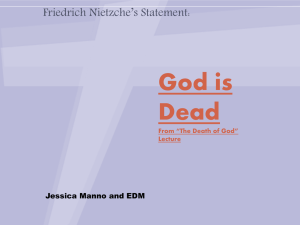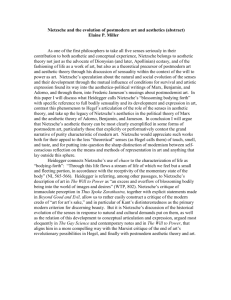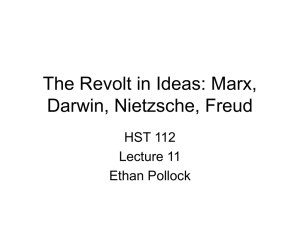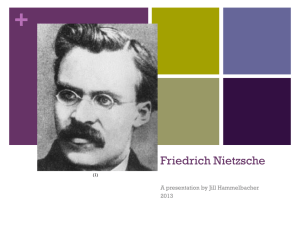Essay Question: What, for Nietzsche, are the advantages and
advertisement
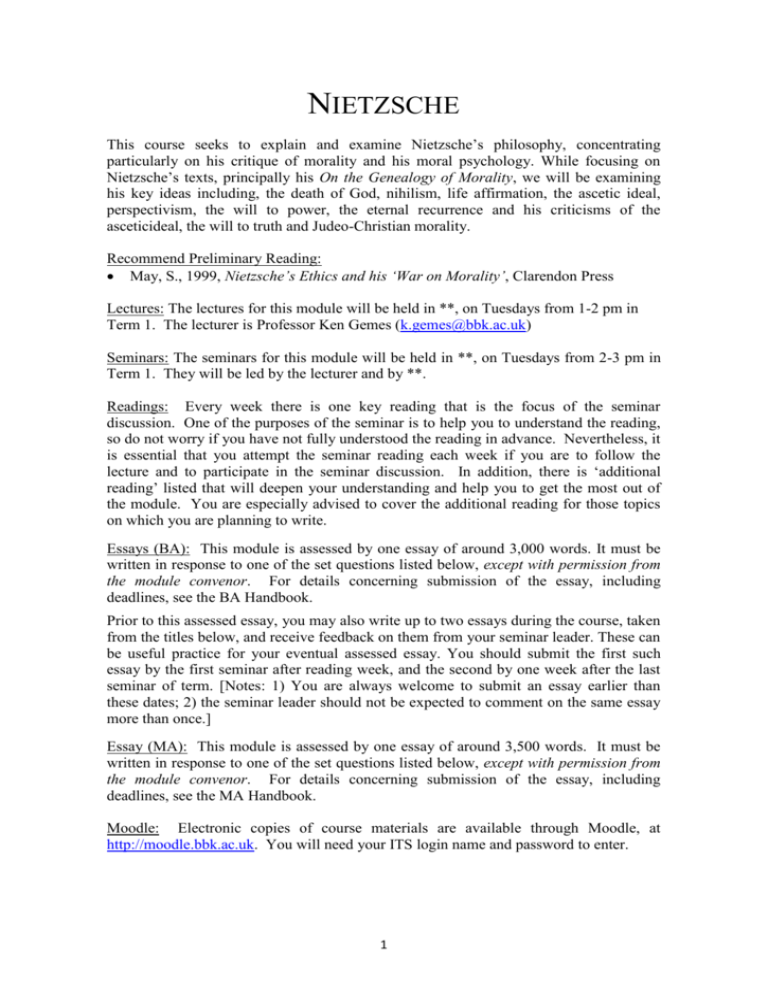
NIETZSCHE This course seeks to explain and examine Nietzsche’s philosophy, concentrating particularly on his critique of morality and his moral psychology. While focusing on Nietzsche’s texts, principally his On the Genealogy of Morality, we will be examining his key ideas including, the death of God, nihilism, life affirmation, the ascetic ideal, perspectivism, the will to power, the eternal recurrence and his criticisms of the asceticideal, the will to truth and Judeo-Christian morality. Recommend Preliminary Reading: May, S., 1999, Nietzsche’s Ethics and his ‘War on Morality’, Clarendon Press Lectures: The lectures for this module will be held in **, on Tuesdays from 1-2 pm in Term 1. The lecturer is Professor Ken Gemes (k.gemes@bbk.ac.uk) Seminars: The seminars for this module will be held in **, on Tuesdays from 2-3 pm in Term 1. They will be led by the lecturer and by **. Readings: Every week there is one key reading that is the focus of the seminar discussion. One of the purposes of the seminar is to help you to understand the reading, so do not worry if you have not fully understood the reading in advance. Nevertheless, it is essential that you attempt the seminar reading each week if you are to follow the lecture and to participate in the seminar discussion. In addition, there is ‘additional reading’ listed that will deepen your understanding and help you to get the most out of the module. You are especially advised to cover the additional reading for those topics on which you are planning to write. Essays (BA): This module is assessed by one essay of around 3,000 words. It must be written in response to one of the set questions listed below, except with permission from the module convenor. For details concerning submission of the essay, including deadlines, see the BA Handbook. Prior to this assessed essay, you may also write up to two essays during the course, taken from the titles below, and receive feedback on them from your seminar leader. These can be useful practice for your eventual assessed essay. You should submit the first such essay by the first seminar after reading week, and the second by one week after the last seminar of term. [Notes: 1) You are always welcome to submit an essay earlier than these dates; 2) the seminar leader should not be expected to comment on the same essay more than once.] Essay (MA): This module is assessed by one essay of around 3,500 words. It must be written in response to one of the set questions listed below, except with permission from the module convenor. For details concerning submission of the essay, including deadlines, see the MA Handbook. Moodle: Electronic copies of course materials are available through Moodle, at http://moodle.bbk.ac.uk. You will need your ITS login name and password to enter. 1 NIETZSCHE BIBLIOGRAPHY Primary Texts [and their abbreviations]: BT The Birth of Tragedy out of the Spirit of Music, translated by Shaun Whiteside, edited by Michael Tanner, Penguin, London 1993 GM On the Genealogy of Morality, trans. Maudemarie Clark, and Alan J. Swensen, Hackett, 1998 UM Untimely Meditations, trans. R. J. Hollingdale, Cambridge University Press, Cambridge, 1983 A The Antichrist trans. R. J. Hollingdale in Twilight of the Idols and The Antichrist Penguin, Middlesex, 1968. BGE Beyond Good and Evil, trans. W. Kaufman, Vintage, New York, 1966. GS The Gay Science, trans. W. Kaufman, Vintage, New York, 1974. TI Twilight of the Idols, trans. R.J. Hollingdale, in Twilight of the Idols and The Antichrist, Penguin, Middlesex, 1968 WTP The Will to Power, trans. W. Kaufman and R.J. Hollingdale, ed. W. Kaufman, Vintage, New York, 1968. Z Thus Spoke Zarathustra, trans. R.J. Hollingdale, Penguin, Middlesex, 1975. Minimum required readings for the course are BT, UM II and GM; do read more! I would also recommend Twilight of the Idols and The Antichrist. Selected Monographs on Nietzsche: Clark, M., 1990, Nietzsche on Truth and Philosophy, Cambridge University Press Janaway, C., 2007. Beyond Selflessness: Reading Nietzsche’s Genealogy, Oxford University Press Kaufmann, W., 1974., Nietzsche: Philosopher, Psychologist, Antichrist, 4th edition, Princeton University Press Lieter, B., 2002, Nietzsche on Morality, Routledge May, S., 1999, Nietzsche’s Ethics and his ‘War on Morality’, Clarendon Press Nehamas, A., 1985, Nietzsche: Life as Literature, Harvard University Press Reginster, B., 2006. The Affirmation of Life: Nietzsche on Overcoming Nihilism, Harvard University Press Richardson, J., 1996, Nietzsche’s System, Oxford University Press 2 Selected Anthologies on Nietzsche: Acompora, C., 2006, Nietzsche's On the Genealogy of Morals: Critical Essays. Lanham, MD: Rowman & Littlefield Publishers Came, D., 2014, Nietzsche on Art and Life, Oxford University Press Gemes, K., & Richardson J.,2013, The Oxford Handbook on Nietzsche, J. Richardson, Oxford University Press Gemes, K., & Simon, M., 2009, Nietzsche on Freedom and Autonomy, Oxford University Press May, S., 2011, Nietzsche's On the Genealogy of Morality: A Critical Guide, , Cambridge University Press Schacht, R., 1994, Nietzsche, Genealogy, Morality: Essays on Nietzsche's "On the Genealogy of Morals”, University of California Press CLASS SCHEDULE WITH TOPICS AND READINGS Week 1: Preliminaries and the Death of God Seminar Reading: GS, 125 Essay Question: What, for Nietzsche, is the meaning of the death of God? Week 2 Nietzsche: The Birth of Tragedy Seminar Reading: BT Essay Question: What is the importance of myth and/or illusion for Nietzsche? Week 3: Untimely Meditations II Seminar Reading: UM, II Essay Question: What, for Nietzsche, are the advantages and disadvantages of the study of history? Week 4: Nihilism and Affirmation Seminar Reading: Gemes “Nietzsche, Nihilism and the Paradox of Affirmation” Essay Question: What is Nihilism? 3 Week 5: What is Genealogy? Seminar Reading: GM, Preface Essay Question: What is Nietzsche’s purpose in doing what he calls “genealogy”? Week 6: Master Morality versus Slave Morality Seminar Reading: GM, First Essay, BGE 260 Essay Question: Explain the difference between slave and master morality and Nietzsche’s attitude to these moralities. Week 7: Free Will and the Sovereign Individual Seminar Reading: GM I 13, GM II 1-3 Essay question: Does Nietzsche have a positive account of free will? Week 8: Ascetic Ideals Seminar Reading: GM, Third Essay Essay Questions: What is the Ascetic ideal? Does Nietzsche value truth? Week 9: Perspectivism and Will to Power Seminar Reading: GM II 6; GM III 7; GM III 12; BGE Sect 36 Essay Question: Explain the meaning and function of Nietzsche’s notion of the Will to Power. Week 10: The Eternal Return and Amor Fati Seminar Reading: GS, Sects. 276, 341 Essay Question: Explain the meaning and function of Nietzsche’s notion of the Eternal Recurrence 4 Other Essay Questions: Does Nietzsche have a secular theodicy? Does Nietzsche have any positive values? What is ressentiment and what part does it play in Nietzsche’s account of slave morality? Does Nietzsche have any positive values? In what sense is Nietzsche an immoralist? 5


